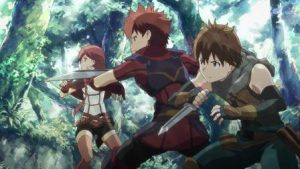
(Neo, Uncooked Media)
Grimgar does something unusual and impressive. It tells a fantasy adventure story that’s a small story of everyday, mundane, universal life and death. It’s about kids in a world of magic and monsters, one of the most hackneyed anime set-ups, but that’s really window-dressing for a story of people coming to terms with death, grief and their own mortality, and how the sun still rises whether they want it to or not.
Six teenagers – four boys, two girls – find themselves in a typical fantasy world, with a medieval-style town surrounded by forests, ruins and deep mines, teeming with monsters. The kids have no memories, but blurt strange words – like “game” and “mobile” – that suggest they’re spirited from our own world.
Actually, there are more kids in the same situation, but these six are the weaklings, the unchosen ones who didn’t make the A-team. Instead, they’re stuck in laughably low-level “adventuring”, hunting green-skinned goblins to scrape a living wage. And killing goblins is hard; it’s also brutal, dangerous and horrible, without chivalry or sportsmanship. The kids aren’t a happy band anyway, bickering and sniping and having to put up with a gratuitously obnoxious team-member, the lewd and graceless boy Ranta (who’s voiced in Japanese by the excellent Hiroyuki Yoshino, whiny and guttural at once).
Despite Grimgar’s beautiful appearance, with organic textures, watercolour-style backgrounds and motion which modulates from sensitive to punchy, the early episodes aren’t attractive. The slow pacing is meant to immerse us in the kids’ daily lives and routines, the solidity of their meals and lodgings, and it often succeeds… but sometimes that pacing is laughably slack and redundant, lessening even the most important scenes by spinning them out beyond their point.
Ranta’s boorishly sexual comments are often matched in how the girls are posed on screen for mildly leery fanservice. For a series about people growing up, Grimgar often feels immature… and yet its characters are credibly immature, in a way unusual in anime.
And that’s part of why Grimgar works. The emerging story is sad, certainly, but it’s increasingly compelling and finally uplifting. It’s about characters learning empathy for people they don’t like; it’s about treasuring loved ones who’ve already gone. Grimgar’s fantasy fights find new levels of reality and intensity, as if characters in a throwaway video game battles were suddenly bleeding and weeping and clinging to one another. The ending changes almost nothing about Grimgar’s world, and yet on its wisely chosen small terms, it feels like it resolves everything.
